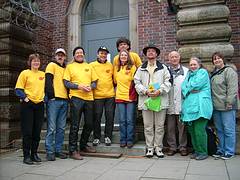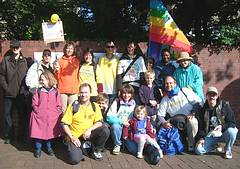

Gastfreundschaft für Flüchtlinge
Leben in Gemeinschaft

 |
 Diakonische Basisgemeinschaft in Hamburg |
Arbeit für Frieden und Gerechtigkeit Gastfreundschaft für Flüchtlinge Leben in Gemeinschaft |
 |
||
|
Dear sisters and brothers at the Open Door Community,
 Good friends accompany Dietrich to the prison in Hamburg  Shining smiles against "shining" atomic waste after Dietrich's release from prison By Dietrich Gerstner “Remember those in prison as prisoners yourself / as if you were in prison yourself.” (Letter to the Hebrews 13:3.) And that’s what I am practicing right now. Only for a couple of days and somehow on my own terms — but still, there’s a difference between going there for just a visit, being seen by everybody as a visitor, a respectable person, and going there as an inmate yourself, and therefore being seen somehow as a criminal, treated by the guards as one of the “others”/the inmates, and by the inmates as one of them. There’s a difference if you leave after a visit of a few hours or are locked down in your cell for 23 hours a day, the doors only opened quickly and shortly for the delivery of food and the pickup of waste. Hardly any communication with anybody. If I want to hear a voice, I have to speak to myself or sing a song. Like “You can’t kill the Spirit, she is like a mountain, old and strong she goes on and on and on … You can’t kill the Spirit …” I am here because I refused to pay a fine of, at first, 51€ ($69.57) — and then, after a (last) trial, of 100€ ($136.41). Two and a half years ago, I took part in a non-violent blockade of a nuclear waste transport southeast of Hamburg. We were hundreds of people in that blockade on the night of the 8th to the 9th of November 2004. In the early morning, the police dissolved our assembly and took us into custody. They considered our assembly illegal. Well, I consider our action legitimate. Laws can change (as you in the States know full well with the civil rights movement and all the legal changes it brought forth), but the deadly danger of nuclear waste remains a fact. On November 9, 1938, there was a big, infamous raid on Jewish life in Germany, a pogrom, sometimes euphemistically remembered as “Reichskristall Nacht” (as so much glass/crystal broke — but so many more lives were broken and destroyed). It was the real public beginning of the extermination of Jewish life in Germany and then in Central Europe. Still, although everybody interested enough could have known about this, many people afterwards claimed, “Oh, we didn’t know. We didn’t know how terrible Hitler was. We didn’t know about the crimes.” Well, even a simple peasant like Franz Jagerstatter from Austria knew. He knew and took the consequences. He refused to cooperate, and he died for it. So did quite some others. In our times it’s so much easier to resist. Nobody threatens to kill me for our action of civil disobedience. And still so many people shun the consequences. To go to jail or prison is a taboo. You seem to be stigmatized if you go to prison, even for a few days. But we know about the dangers of atomic waste, whether it comes from the weapons’ production or energy production. It will remain utterly poisonous and deadly for millions of years. And nobody knows where to put it, where there would be a “safe” place for so many generations. So I believe we have to act; we have to withdraw support from this “filthy and rotten system” (Dorothy Day) personally and politically, and, if necessary, face the consequences. Phil Berrigan was often asked, in the peace movement, in the prison, in talking with pastors and politicians, and in talking with well-intentioned bureaucrats of all sorts: “What kind of disadvantage could an act of civil disobedience have for me?” Rarely he was asked: “What happens if I don’t resist?” In the U.S. I learned about the Catholic Worker Movement, about its works of mercy and justice, and also about its acts of resistance. And at the Open Door I came in touch with people who spend so much time in prison, who are even killed in prison, but who keep alive their dignity and their self esteem. For 20 years I have been visiting my very good friend Tony whenever I have the chance to do it, and for me he is a real model of keeping hope and human spirit alive in a deadly, life-choking environment. Therefore I am glad that I am able to choose in freedom to take on the consequence of incarceration, supported by my community, Brot & Rosen, and by my family, believing that with all our small steps together we can change the world. “Never doubt that a small group of thoughtful, committed citizens can change the world; indeed, it’s the only thing that ever does” (Margaret Mead). All the best, Shalom / Salaam, Dietrich Gerstner, Editor's Note: "Connections" (first published in: Hospitality, vol. 26 nr.8 / Sept.-Oct. 07, p.2; The Open Door Community, Atlanta GA 30306)
|
MittragenUnsere Gastfreundschaft für obdachlose Flüchtlinge
wird erst möglich durch Spenden
und ehrenamtliche Mitarbeit
weiter... MitfeiernHausgottesdienste, Offene Abende und immer wieder mal
ein Fest: Herzlich willkommen bei uns
im Haus der Gastfreundschaft
weiter... MitbekommenMöchten Sie regelmäßig von uns hören
und mitbekommen, was passiert?
Abonnieren Sie am besten unseren kostenlosen Rundbrief
weiter... MitlebenImmer wieder fragen uns interessierte Menschen,
ob und wann sie uns besuchen kommen können.
Wir freuen uns sehr über dieses Interesse.
weiter... |